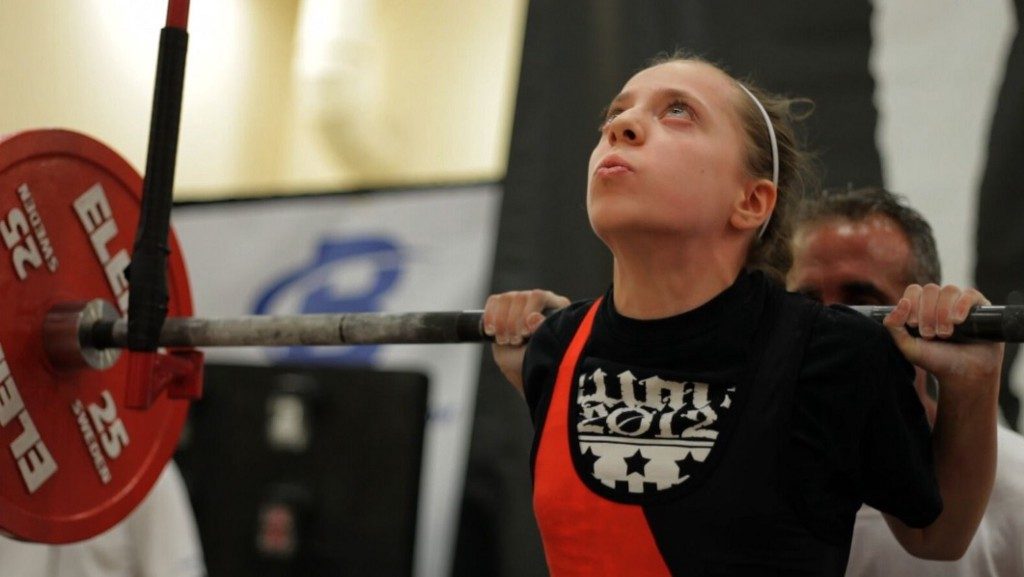Jessie Auritt is an award-winning documentary filmmaker based in New York City. Her short film, “The Birdman,” screened at festivals around the country and won the Slamdance Grand Jury Prize for Short Documentary in 2013. In addition to independent filmmaking, she has shot, edited, directed, and produced videos for UNICEF, IFC.com, the New York Daily News, and many other companies and nonprofit organizations. Auritt is an alumnus of the IFP Documentary Lab and a member of the women’s filmmaker group Film Fatales. “Supergirl” marks her feature directorial debut.
“Supergirl” will make its World Premiere at the 2016 Hamptons International Film Festival on October 9.
W&H: Describe the film for us in your own words.
JA: “Supergirl” tells the coming-of-age story of Naomi “Supergirl” Kutin, an 11-year-old orthodox Jewish girl and world-record holding powerlifter. As Naomi grows into a young woman and tries to hold on to her powerlifting title, she faces multiple challenges that test her true inner strength.
W&H: What drew you to this story?
JA: I was intrigued that a modern orthodox Jewish girl, whose religion typically has very traditional gender roles, was participating in the male-dominated sport of powerlifting.
Having grown up as a secular Jew and an athlete myself, I was fascinated by the dichotomy of her world. I immediately wanted to find out more about Naomi and explore the intersection of these two facets of her life.
W&H: What do you want people to think about when they are leaving the theater?
I hope that “Supergirl” will be a source of empowerment and inspiration for people, particularly women and girls. I hope that the film will encourage them not be afraid to pursue their goals, even in the face of adversity.
I also hope that audiences will identify and empathize with Naomi and her family on a personal level that will transcend preconceived stereotypes or stigmas — that they’ll realize you shouldn’t make assumptions and judgments about people before getting to know them.
W&H: What was the biggest challenge in making the film?
JA: As Alfred Hitchcock famously said, “In feature films the director is God; in documentary films God is the director.” I found this this to be very true in making “Supergirl”: There were things that happened during the course of filming that were completely unpredictable and out of our control.
I think the most challenging thing was to learn to just go with the flow and adapt the story to the things that were happening in real life.
W&H: How did you get your film funded? Share some insights into how you got the film made.
JA: The film was funded through a combination of grants, crowdfunding, and self-funding. For the most part, everyone who worked on the film agreed to work for a lower or deferred rate because they believed in the project and were excited to be a part of it. As a result, we were able to make the film for relatively little money upfront.
W&H: What does it mean for you to have your film play at HIFF?
JA: I am extremely excited for the film to have it’s world premiere at the Hamptons International Film Festival. “Supergirl” has been three-and-a-half years in the making and I can’t wait to share Naomi’s story with the rest of the world.
HIFF is a great festival and it means a lot for “Supergirl” to be playing alongside other strong films and to be in the company of other well-respected directors. I’m also happy for the film to be premiering in New York since it’s a local tri-state area story.
W&H: What’s the best and worst advice you’ve received?
JA: As “Supergirl” is the first feature length film I directed and edited, I received a lot of great advice along the way. One of the best pieces of advice was from our editing adviser, Penny Faulk, who said to pick one word that best represents the main theme of the film. When editing the film, ask yourself, “Does this relate to that word?” If it doesn’t, it hits the cutting-room floor. As difficult as it is to “kill your darlings,” you have to do it for the good of the film.
The worst advice was probably from a potential funder who suggested that we try to partner with Victoria’s Secret.
W&H: What advice do you have for other female directors?
JA: Don’t be afraid to do things your own way and blaze your own trail. If you are running up against roadblocks when trying to get your film made in a conventional sense, find a detour.
As cliche as it sounds, if there’s a will, there’s a way. You just have to be patient and determined and make it happen yourself.
W&H: Name your favorite woman-directed film and why
JA: I have a hard time narrowing it down to one favorite woman-directed film but three films I really like are “Lost in Translation” directed by Sofia Coppola, “Me You and Everyone We Know” directed by Miranda July, and “Obvious Child” directed by Gillian Robespierre. I like all of these films because the characters and subject matter do not conform to conventional societal stereotypes.
W&H: Have you seen opportunities for women filmmakers increase over the last year due to the increased attention paid to the issue? If someone asked you what you thought needed to be done to get women more opportunities to direct, what would be your answer?
JA: There is definitely still a huge gender discrepancy in the filmmaking industry as a whole, but it seems that it is slowly becoming more inclusive of women. Things are looking up for women in the documentary world in particular. When I participated in the IFP Documentary Lab last year, eight of the 10 films selected were directed by women.
Some grant programs for women have begun to emerge from major film institutions, but I think we still need even more of those initiatives to give women more opportunities to direct.







